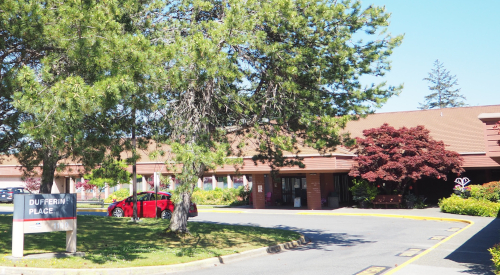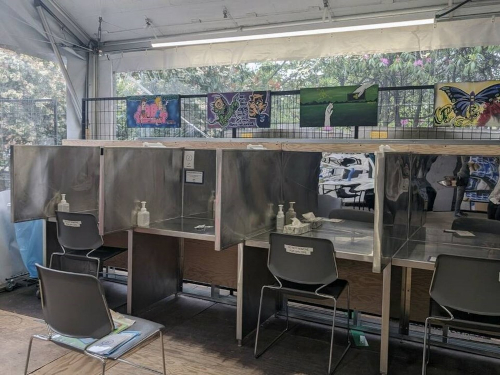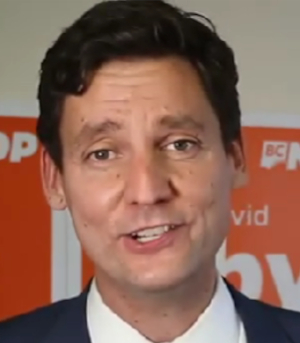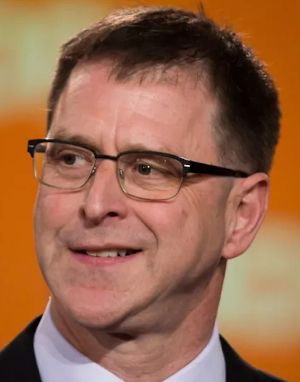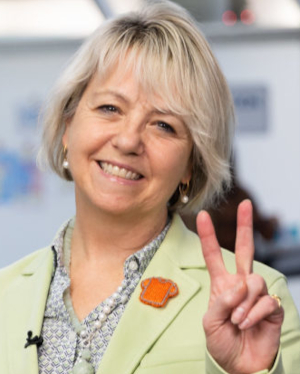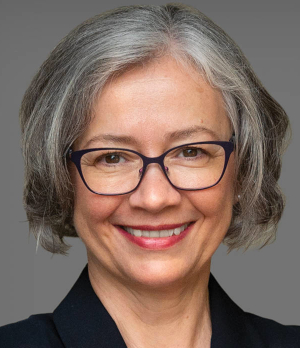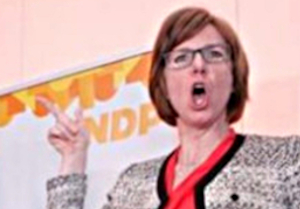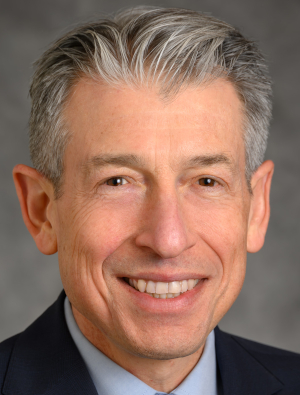
Reflections on Vancouver, British Columbia and other topics, related or not
Junkies matter more
than seniors
But poverty pimps matter most. It’s for their support
that Premier David Eby encourages drug addiction
Greg Klein | July 13, 2024
In a new development of B.C.’s junkie-pandering policies, long-
term care residents have to tolerate drug use and criminal activity.
Just across a parking lot from Nanaimo Regional General Hospital, dedicated staff at Dufferin Place look after residents up to a hundred years of age or older. The long-term care home has gained a well-respected reputation since its inception in 1987. But around 2022 David Eby’s poverty pimp government quietly replaced some of the seniors’ accommodation with a “specialized population unit.”
That’s a euphemism for junkie housing.
They’re not even elderly junkies. They’re just junkies. Typical junkies. Typical junkies with all the typical junkie traits and behaviour that plague communities throughout the country. And they enjoy junkie entitlement too. Island Health, a strongly ideological government provider of medical services, allows them to use psychosis-inducing drugs, subject staff and seniors to fentanyl fumes, conduct drug deals with visiting criminals and pack weapons inside a building otherwise inhabited by helpless seniors.
This is a story ignored by B.C.’s courtier media but reported by True North, which followed a B.C. Conservative Party news release. It jibes with reports from other (mostly non-B.C.) media about B.C. hospitals where staff and patients are forced to tolerate the same conditions.
B.C.’s Ministry of Health requests that hospitalized junkies consume
their drugs in these newly provided facilities just outside of hospitals.
In Vancouver, according to Postmedia, Providence Health Care now tries to move the problem to new drug injection and inhalation sites. But they’re placed on hospital grounds immediately outside hospital buildings. (Where, BTW, tobacco and vaping are strictly banned.)
In response to junkie behaviour, St. Paul’s Hospital has hired 60 extra security guards in the past year alone. They’re part of an army of 320 new hospital security guards announced by Health Minister Adrian Dix last April after media reported his pandering to hospitalized junkies. No one seems to mention the diversion of scarce health care money to deal with people who belong in prison. And the guards’ apparent role is to try to limit junkie behaviour, not stop it.
Premier David Eby: Junkies matter more than seniors
and hospital patients, but poverty pimps matter most.
As Fraser Health Authority puts it, when junkies refuse to co-operate “our relational and on-site security teams will address the situation in consultation with the patient’s clinical team.” Tough talk, by B.C. standards.
Why allow junkie behavior in and around hospitals? Why impose junkies and junkie behavior on seniors’ residences? (Dufferin Place isn’t the only one. Another is Victoria’s Summit Long Term Care home and there may well be others.)
Defenders might reply with fashionable cliches of exigency: an “overdose emergency” or “homelessness crisis” that prioritizes addicts over hospital patients and the elderly. But this is yet another development in an ever-expanding program that encourages criminal, dangerous, insane behavior at the expense of family communities, local businesses and public safety.
B.C. Health Minister Adrian Dix: Junkies matter more than
seniors and hospital patients, but poverty pimps matter most.
The program includes free income for declaring oneself a junkie (a category of “disabled,” according to B.C.’s Ministry of Social Development and Poverty Reduction); priority for free homes from B.C. Housing; tolerance of crime-ridden homeless camps occupied by those waiting for free homes; tolerance of psychosis-inducing drug use in homeless shelters; free psychosis-inducing opioids for use or resale to buy even stronger psychosis-inducing drugs; considerable priority in health care; almost unlimited free meal services and food banks that let junkies spend their welfare money on psychosis-inducing drugs; psychosis-inducing drug drop-in sites with attentive psychotic-friendly staff; extraordinary leniency towards repeat criminals that allows additional income for psychosis-inducing drugs; tolerance of bizarre, dangerous and psychotic behaviour.
That’s quite a list already, but it should be capped with one more item: special victim group status under B.C.’s own version of political correctness/woke.
B.C. Provincial Health Officer Bonny Henry:
Junkies matter more than seniors and hospital
patients, but poverty pimps matter most.
Of course “progressives” will always milk PC rhetoric for all they can. Just as liberal whites in Toronto love to express condescending compassion towards blacks, B.C.’s Enlightened do the same for junkies. But their compassion is selective. It doesn’t extend to people who are victimized by the “victims.” Long-term care residents are just one example.
Junkie-encouraging policies don’t just benefit junkies. Big-government ideologues enjoy their lordship over this dependent caste. Other beneficiaries, strangely well-represented in Canada’s elite, hate normality. They revel in its destruction.
B.C. Minister of Mental Health and Addictions
Jennifer Whiteside: Junkies matter more than seniors
and hospital patients, but poverty pimps matter most.
But a larger group, possibly even more numerous than junkies themselves, are members of B.C.’s poverty pimp industrial complex. It’s growing in size and influence, and it’s very much David Eby’s milieu.
The complex is vast, and some of its beneficiaries have benign or even laudable intentions. It’s hard to fault paramedics or firefighters, even if their unions value the membership growth resulting from junkie emergency calls. So too for nurses, although the Harm Reduction [sic] Nurses Association casts a pall on their profession. Bylaw officers, community safety officers, municipal park rangers, government and hospital security guards, and others rank among non-ideological and non-opportunistic occupations whose unionized ranks happen to swell with junkie mayhem. There are non-unionized beneficiaries too, mostly providing additional security services or even the drugs themselves.
Nanaimo MLA and B.C. Minister of Social Development
and Poverty Reduction Sheila Malcolmson: Junkies matter more
than seniors and hospital patients, but poverty pimps matter most.
But some people actively encourage addiction, and they do so for both fun and profit. They include opportunists of scant intelligence but dark sources of funding who travel the province organizing homeless camps in politically strategic or especially destructive locations; tax-funded organizations like the Vancouver Area Network of Drug Users, its spinoffs and related groups that advocate addiction and support drug pushers; taxpayer- and law profession-funded hustles like the Pivot Legal Society and B.C. Civil Liberties Association that manage to suck up to B.C.’s political and legal establishment while working to de-criminalize crime; a great many tax-funded self-serving shit-disturbing gangs that manipulate the chaos of neighbourhoods like downtown Vancouver and Victoria.
B.C. Parliamentary Secretary for Seniors’ Services
and Long-Term Care Harwinder Sandhu: Junkies
matter more than seniors and hospital patients,
but poverty pimps matter most.
Then there’s the housing societies.
They might constitute the greatest hustle of all. It’s led by people with zero non-hustle qualifications but close connections within their old girls’ and boys’ network. Like Toronto’s white liberal racists, they pride themselves on their condescension to people they consider inferior. In doing so they build empires that fatten their own salaries and perks, and expand their unionized workforce. Thanks to the longstanding lack of vigilance from B.C. Housing—their main source of pillage—housing society staff are often incompetent and sometimes outrageously corrupt. (Some examples here and here.)
Yet it’s for their sake that B.C.’s elite has largely re-diagnosed addiction and crime as the result of “un-met housing needs.” The NDP no longer blames mental illness and, after all these years as a phony street level activist and elected politician, Eby shows no intention of improving mental health care. Junkies and criminals are now described, with media collaboration, as “the unhoused” or “persons experiencing homelessness” as if that explains their behaviour.
Still, housing society bosses might not wield influence relative to their privilege. A much stronger power in B.C.’s junkie-encouraging political culture might be housing society unions—which used to be and still should be considered public sector unions. Together they hold enormous media influence in addition to their ability to stage demos, go on strike and carry out election campaigns. Their greatest source of growth comes from the junkie compassion ploy. The goal of providing each and every junkie with a permanent home and attendant babysitting staff will continue union growth indefinitely. Every new addict enhances their power.
And that of David Eby. He’s always ingratiated himself with public sector unions and remains the most successful politician to stake a career on the poverty pimp industry.
B.C. Seniors Advocate Dan Levitt: Junkies matter more than
seniors and hospital patients, but poverty pimps matter most.
Yet he faces the electorate in October, if not sooner. During a perceived threat to the American deep state and the fall of some European incumbencies, a supposedly dissident provincial party rises in the polls. Increasing crime now includes rioting junkies, defended by a housing society poverty pimp, attacking Victoria cops, firefighters and paramedics. For the first time, and very belatedly, B.C.’s junkie-friendly policies might face serious scrutiny. So would Eby back down on his destructive policies?
More likely he’d double down.* Every indication suggests that Eby intends to maintain widespread drug addiction, even encourage it. That’s been his goal since his earliest days as a social justice phony—to boost his career by expanding the poverty pimp industry.
Not even a surprise election result would dismantle the industry. Neither contending party has the will, let alone the ability, to do so. Like robber barons in an exploitative economy and Jimmy Swaggart-types in a hypocritical theocracy, B.C. poverty pimps and their unions wield extraordinary power. Exploitative and hypocritical, the poverty pimps shall prevail.
*September 16, 2024, update: Eby appears to have backed down pending the October 19 election, but his assurances come with insufficient detail and uncertain timelines. The NDP will have to carefully manage any appearance of reform to assuage public concern while appeasing the party’s more unhinged social revolutionaries. The party likely now faces a division between candidates, staffers, union officials, government appointees and government-funded activists who want to destroy normality but worry about losing the election, and those who want to destroy normality but expect to retain power no matter what.
With ideological malice so firmly entrenched, any pretense of reform would likely dissipate following an NDP victory. A B.C. Conservative government, meanwhile, couldn’t even slow B.C.’s destruction. The Cons might, at best, slow its rate of acceleration.
